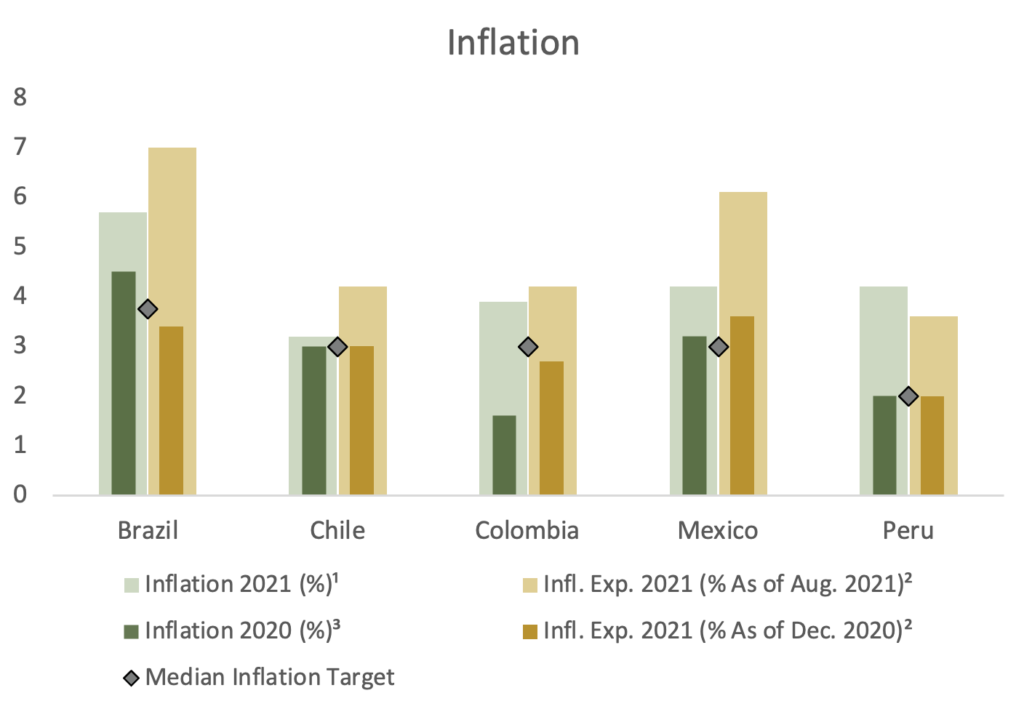
Inflation has become a growing concern for central banks in Latin America and the Caribbean. The recovery in economic activity was stronger than expected in the first months of 2021, reflecting the stimulus that governments deployed to mitigate the effects of the pandemic and higher mobility and lower containment measures. However, inflation and inflation expectations in the region are also rising (see the figure below).
This is all happening as countries are being threatened by new variants of COVID-19, such as Delta, and new waves of infection that could delay economic recovery and growth. The perils are potentially great. Many countries in the region now face the twin risks of economic slowdown and high inflation, with a resulting impact on the poor that could be immense.

- Change in the Costumer Price Index from December 2020 to August 2021.
- Expected change in Costumer Price Index from December 2020 to December 2021.
- Change in the Costumer Price Index from December 2019 to December 2020.
Source: Own estimations using data from Haver and the IDB.
The Responsibility for Fighting Inflation
For years now, central banks have been using inflation targeting, explicitly or implicitly. When inflation expectations were higher than the inflation target, this often led to an increase in the policy interest rate. That decreased the threat of inflation, which particularly affects the poor. The big questions today are whether current developments reflect a temporary or a permanent pressure on prices and whether inflation expectations are being affected. Most importantly for policymakers, it begs the question as to what should be done.
Our research suggests that the priority of central banks in the short and medium term should be the fight against inflation. That will help preserve citizens’ purchasing power, and because it will empower entrepreneurs to make sound economic decisions, also eventually help with economic recovery. By contrast, if inflation expectations are unanchored as a result of central banks’ inaction, the negative impact will be substantial both in the short-term because of a rise in inflation and in the medium-term because of the additional costs created by reacting late and seeing an additional tightening of interest rates.
The management of inflation can affect distinct economic tiers of the population differently. In a recent study, we demonstrated how low inflation is associated with a reduction in poverty and a growing middle class. We also found that inflation is correlated positively with unemployment and negatively with inequality. Our model suggests that increasing inflation by 1% increases the percentage of low-income households by around 7% and reduces the percentage of high-income households by around 1%.
The Impact of Inflation on the Poor
Inflation places a very high burden on poor households because they are largely hand-to-mouth consumers. Compared to richer families, even small increases in prices have strong implications for their consumption. Uncontrolled inflation, moreover, generates poverty traps. It forces low-income households to avoid starvation by eating lower quality food, potentially affecting their children’s cognitive development.
The poor are more exposed to inflation because they lack the means to preserve their purchasing power. Their access to financial markets is limited or nonexistent, so they cannot use credit to smooth their consumption. Or if they have access, they depend on debt, usually from informal markets, to meet basic needs. In addition, their income usually also comes from the informal sector, so they are not covered by public or private institutional arrangements that protect employees from price increases. And they do not have the capacity to save, meaning they can neither use their money to maintain their consumption habits nor buy indexed financial instruments to conserve the value of their assets.
High-income and middle-income households, on the other hand, have some access to those tools and ever greater access to them as their income increases. Thus, efforts to reign in inflation are a fight not only against the vulnerabilities of the poor but also against inequality.
Targeting Inflation for Inclusive Growth
The goal of the region’s central banks is controlling inflation. They will be under pressure to increase the policy rate if they believe inflation is becoming a permanent phenomenon. They need to both ensure inflation expectations are anchored and do not hold back the recovery. The right decisions will help partially offset the increases in poverty and inequality we are seeing as a result of the pandemic, help businesses make rational decisions and contribute over the long term to economic health and inclusive growth.


Inflation is really too much brutal for the poor folks out there, These people actually end up spending a good chunk of their earnings just on the basic stuff with no room for savings or anything.